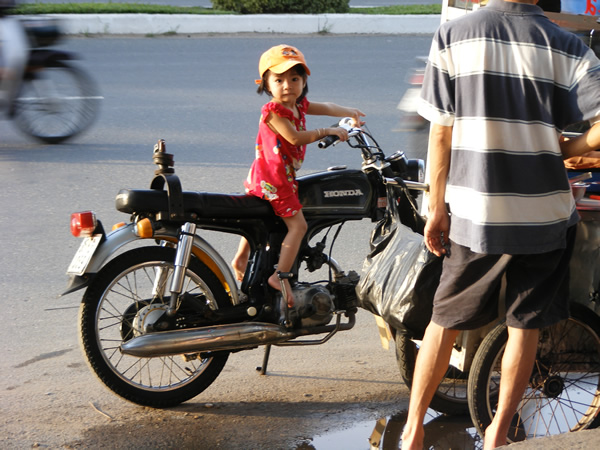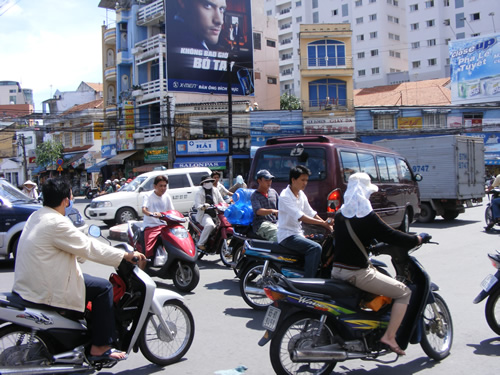Living and Teaching English in Can Tho Vietnam
The Rooster in the Cafe, and Other Sights and Experiences
Article and photos by Nathan Edgerton
 |
| I stopped while writing the essay to snap this picture. Not to worry, the girl's father is standing right next to her. |
A curious rooster searches the street side café where I sit. The evening sun lights its bright plumes as it wanders about, its brown feathers highlighted by colorful streaks that burn orange at the tip, then calm to a smoldering red near the base. After a few minutes, a man from a neighboring shop comes with a handful of seed to lure the bird back home.
Scenes such as this, still noteworthy for me though less so for the locals, are wonderfully common in Can Tho, the biggest city in the Mekong Delta region of southern Vietnam. Even after three months of teaching English here, I can still spend a whole afternoon pleasantly watching the sights of the city. By “sights,” however, I do not mean the pagodas, beaches, or markets commonly listed in guidebooks. Can Tho has few of these, which may make it seem unremarkable to a casual traveler. The best sights Can Tho has to offer, to me, are the people whose lives are constantly on public display. Unable to hide inside cars, construction workers, businessmen, grandmothers, youthful couples, and families of four pass by on motorbike all day in a parade of personalities. Watching this procession from a café is perhaps one of the most enjoyable ways to observe the character of Vietnam.
During the day, children in short-sleeved uniforms with tiny backpacks cling to their mothers on the way to school. Image-conscious women avoid tanning, which is considered unattractive, by riding under the scorching sun with their entire bodies covered in gloves, sleeves, and hats. Messengers strain to maneuver their motorbikes with improbable loads, swaying with care to avoid spilling their cargo; perhaps a refrigerator, a 5-foot potted tree, or an unharnessed television that must be held in place with an arm that most people would not consider to be available for the task.
By night, groups of friends ride in pairs or packs, chatting away and sometimes holding hands as they speed down the road. Some young men drive fast to impress their girlfriends. Other couples take easy joyrides, the rider on back massaging the driver’s shoulders or holding tightly. In fact, “xe om”, the Vietnamese word for motorbike, means “hugging vehicle.”
I should be clear, though, that while Vietnamese transportation has many peaceful and romantic qualities, it is often far from idyllic, and sometimes quite dangerous. After arriving at the airport in Ho Chi Minh City and finding the teacher, Tuan, and driver that the university had sent to pick me up, we immediately entered a five-kilometer gauntlet of cars, cyclos and, sometimes, cows. As I talked with Tuan, I on many occasions left sentences hanging in the air and froze in silence, entranced by women carrying large baskets of fruit across swarming intersections or huge cargo trucks surging far across the center-line to pass motorbikes before swerving into the proper lane only feet before a collision.
 |
| A busy intersection in Ho Chi Minh City. Look closely, and you'll see vehicles traveling in all four directions, plus a few others in between. |
I became comfortable with the traffic in quite a short time, but only in the way that I’m comfortable with the wide-eyed, ankle-hunting little dog that is tied to a chair at my gym. Everything is ok, as long as you act with caution. In the first few weeks, I felt so amazed that people weren’t regularly meeting fiery deaths along the road that I thought there must be some unstated harmony to the traffic. Over time, though, I learned that accidents are all too frequent. While intersections once seemed to be a matrix of compromises, and indeed compromise is required, I see now they are also often a series of ultimatums delivered with a smile and nod. Slow down or we crash.
Fortunately, coping with traffic has been one of the most challenging parts of the experience. Can Tho has not thrown me many of the challenges I’d expected when coming to Vietnam. A spacious and, more importantly, well-ventilated apartment with a hot shower was given to me by the university. I had filled my backpack until the zippers held taut and the pockets bulged with necessary conveniences such as insect repellant and sunscreen, but soon after arriving I found that the city already has four expansive supermarkets with nearly everything I could reasonably need. I’ve not even had to give up the internet, as my roommate and I have set up a connection in our apartment for only 100,000 VND (about $6) per month.
The rooster is back. It spies the room with one eye and stalks forward, looking for more food or perhaps fellow chickens (who knows how many there are here?). I’m the only one who pays it any attention as it wanders into the center of the café. Suddenly, it spreads its wings and stretches forth its neck. “Irch-irch-irch-irrrrrrr!” the rooster commands, its cry dominating the din of voices in the room. Some customers startle, others simply wait for the interruption to pass before continuing their conversations. Unaware that it is out of place (actually, maybe I’m the only one who finds its presence odd), the rooster returns to pecking about and investigating shiny objects.
Even though it is quite easy to find most modern comforts in Can Tho, the city is at no loss for local specialties. I can buy a four-pack of Guinness at the supermarket when I want, but it is even easier to get a three-liter bag of locally-brewed beer in the alley next to my apartment. The food, sweeter than the typically salty cuisine of northern Vietnam, is cheap and delicious. At 33 cents per meal, it is not a problem to eat out three times a day even on my $80/month salary.
While in the U.S. meals are a very social event, they are more commonly eaten at home with the family in Vietnam. Coffee shops take the place of restaurants as meeting places, but they also provide a haven of privacy in a place where people share living space with big families. They have multiplied to a surprising degree because of their important role. In fact, if I left my present coffee shop and headed toward home while stopping for coffee at every shop along the way, it would probably take well over an hour to travel the 500 meters.
The question “Do you have free time?” is almost invariably followed by “Would you like to enjoy coffee with me?” This has been a bit frustrating for me because coffee tends to take a while and, as a native English-speaker, I receive many invitations so that I end up having two or three requests for every day of the weekend. Though it has been challenging to control the flow, the stream of invitations that I receive does testify to the eagerness of the students to practice English.
Can Tho University is the biggest in the Mekong Delta region, and the best students matriculate there. I’ve found teaching to be easier than I expected, and in large part I feel this is because my students are so respectful and dedicated. I am naturally very quiet, and often have to shout across the dinner table in a noisy restaurant so my friends can hear me. Before I came, I was wary of my ability to control a classroom with my voice. Yet, I’ve found that I only need to say “shhh” and raise my finger to my lips, or perhaps wave my arms if they’re particularly excited by something, to quiet the class.
Teaching has been challenging for me, but I am lucky to have a light schedule so I haven’t become burned out in the way teachers sometimes do. While I’ve read of teachers in South Korea or Taiwan taking on 40 hour loads, I teach in class for only 15 hours per week. After spending an additional 10 hours per week for lesson planning and grading, I still have plenty of time to explore my own interests, such as reading, taking bike trips, playing tennis, and studying Vietnamese. The program through which I applied, Princeton In Asia, has many teaching posts throughout Southeast Asia, most of which have teaching loads similar to my own. This low workload has allowed me many opportunities to explore my new surroundings and interests.
The rooster has moved on, perhaps to a more luxurious internet café or maybe to the motorcycle repair shop next door. It will be back another day, and so will I. For now, though, I close my tab – 50 cents for two coffees – and hop on my bike for the trip home. I’ll turn left and ride against the oncoming traffic, hugging the curb as is customary for vehicles traveling the wrong way down one-way streets. This, as well as speaking before large groups and taking my shoes off at the doorstep, once seemed so strange. But it’s okay, I’m used to it by now.
|
For More Information
Princeton In Asia: This is the program through which I found my job. It is affiliated with Princeton University, but is open to graduates of all universities. Most applicants are in their early to late twenties.
Can Tho University
A very interesting historical and anthropological view of Vietnam is offered in Neil Jamieson’s Understanding Vietnam, and Andrew Pham’s Catfish and Mandala gives a view of conditions in contemporary Vietnam.
Important Notes:
- Obtaining a visa to Vietnam can be a long process, so make sure to begin well in advance of the time you hope to come. If you come through Princeton in Asia, they will contact the organization to make sure your visa gets through.
- Even if you are living in Vietnam for an extended period of time, don’t forget to bring your passport with you when you travel in the country. You will need to register with the local authorities if you spend the night in another town.
- Small gifts from your home country are a great idea. I brought a few rolls of pennies from the U.S. to give to my students, and they were very grateful for the souvenirs.
|
Nathan Edgerton moved to Southeast Asia to teach at Can Tho University in southern Vietnam in 2007. What was supposed to be one year eventually became more than 7. In the meantime, he has taught at a public school in Singapore for a year and a half, worked as a writer in Chiang Mai, Thailand, and cycled across Vietnam.
He has been living in Bangkok for the past 15+ years, where he studied for a master's degree at Chulalongkorn University and currently works as Director of Operations Development at The Knowledge, a Thai language school near the city center.
|
